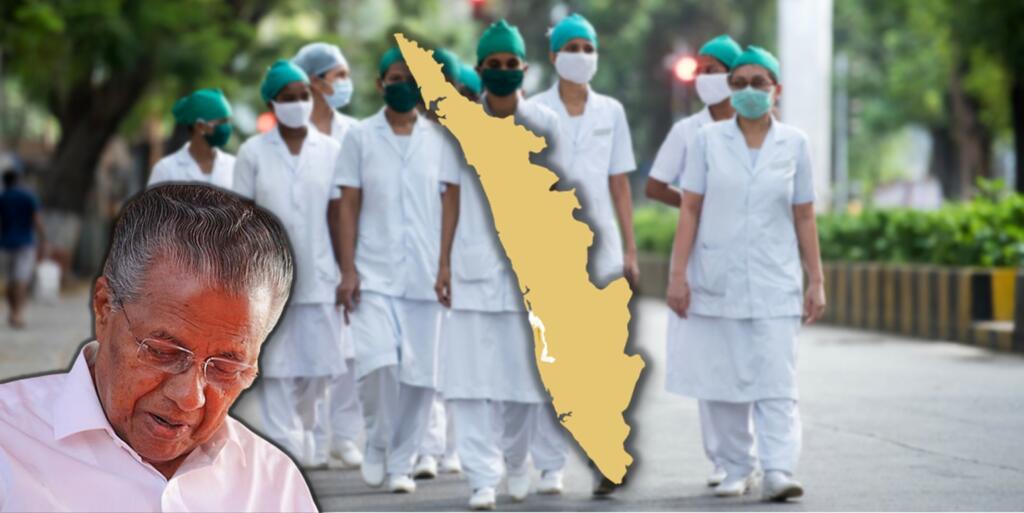Do you remember the movie Tiger Zinda Hai? The movie plot revolved around nurses who migrated from India to the Middle East in order to earn their livelihood. Well, one must have thought what are so many Hindustani nurses doing on foreign soil? But such is actually happening in reality.
Nurses from Kerala migrate in huge numbers and give their services abroad. Now, there are two questions here. First, why do nurses from Kerala migrate? And second, what impact does this migration have on India as well as the world?
Nurses: The Brand Ambassadors of Kerala
As per the World Health Organisation (WHO), two fifth of India’s medically qualified nurses are from Kerala. A state that accounts for only 3 % of the country’s population, has 39 % of the country’s nurses.
As per the Indian Nurses Association, more than 8,500 nurses graduate in Kerala every year. Out of this number, more than 70% move abroad within a year. The biggest reason for training so many nurses every year is migration and the reasons behind migration are multiple. While we look at the pros and cons of migration, first let’s look at a brief history of migration of nurses.
The first generation of Malayali nurses migrated to Germany in the 1960s. They were affectionately called Brown Angels by the natives there. When Germany was struggling to become an economic giant, it needed workers from abroad.
While many blue-collar jobs were taken up by those from Turkey and around, the need for doctors and nurses remained. The void was filled by the nurses from Kerala. Around the same time, migration also began to Canada and Italy to work in church run hospitals.
Currently, more than half a million nurses from Kerala are employed abroad. Around 21.5 per cent of the nurses in Saudi Arabia are from Kerala. The figure is 15 per cent for the UAE, 12 per cent for Kuwait, 5.7 per cent for Qatar, 5.5 per cent for Canada and over 3.2 per cent for Maldives.
The health infrastructure of many nations, including the majority of Europe as well the Gulf, relies on nurses migrating from Kerala. The Keralite nurses not only provide care to the patients abroad, but also build a better life for themselves and their kin back home. A phenomenon seen across the country.
Also read: From Nipah to Monkey Pox, why Kerala is a hotbed of zoonotic diseases?
Why do nurses from Kerala migrate in large numbers?
The colleges offering nursing courses are ample throughout the nation. The nurses trained in India earn a salary of around Rs 10,000 to Rs 30,000, barring the department heads. Once a nurse migrates, she would earn twice or thrice the amount.
The offer generally comes at a young age and the ones who take up these opportunities, ensure a good standard of living not only for themselves but also for their families back home. Many families build on the success of the first-generation migrators.
While good earning being one of the most prominent reasons, the true reason behind the migration was the dignity of labour. While the nurses face severe disregard in India and earn no respect, the condition is polar opposite abroad.
When abroad, the nurses command good respect. Along with that doctors consult nurses on medication for patients and listen to their suggestions. Nurses abroad are held accountable for the health of their patients unlike India where the onus is only on the doctors and nurses are reduced to mere bystanders.
To add on, other than practitioners, nurses abroad are also allowed to take up roles like that of nurse educator, researcher or administrator. To sum it up, the reasons which end up favouring migration are subsidised education, high pay scale, dignity of labour and the possibility of permanent residency.
The concern
Nursing is one of the professions that allows women to bring in foreign currency and it has practically happened. But there is a concern for the state. In the southern state of Kerala there is a grave deficiency of nurses. The large-scale migration abroad has created a crisis in private hospitals in the state.
As per reports, most of the hospitals in the state have 50% vacancies for graduate and experienced nursing staff, especially in the ICU, CCU and operation theatres. Due to this, private hospitals have increased their hiring from other states. To add on, due to shortage of workforce, nurses often complain of heavy workloads and long working hours.
Also read: The communist Kerala model of COVID control is back in full glory as daily cases cross 50K
The failing health model of Kerala needs its nurses
The most developed state of India, as per the liberals, that is Kerala, has been a hotbed of zoonotic diseases. Kerala is the state where the first case of Covid-19 infection was recorded. The same state also recorded the first Nipah virus and monkey pox cases. The Thiruvananthapuram district became the epicentre of Zika virus outbreak.
The much-hyped Kerala health model has been exposed well by the Covid-19 pandemic. While India was walking on the road of mass scale vaccination, Kerala was still registering more than 7000 Covid cases in a day. Yes, in a day.
Kerala’s staggering Covid-19 caseload was a result of acute policy failure. Wide scale shortages of ICU beds, ambulances and proper care were reported from across the state during October and November 2020. The Kerala unit of the Indian Medical Association had issued a press release on the lack of basic infrastructure in the healthcare sector thus opening a can of worms.
This raises a serious question. Wouldn’t it be better if Vijayan had provided the nurses with better facilities and retained them? This would have prevented the state from the catastrophe.
Support TFI:
Support us to strengthen the ‘Right’ ideology of cultural nationalism by purchasing the best quality garments from TFI-STORE.COM
